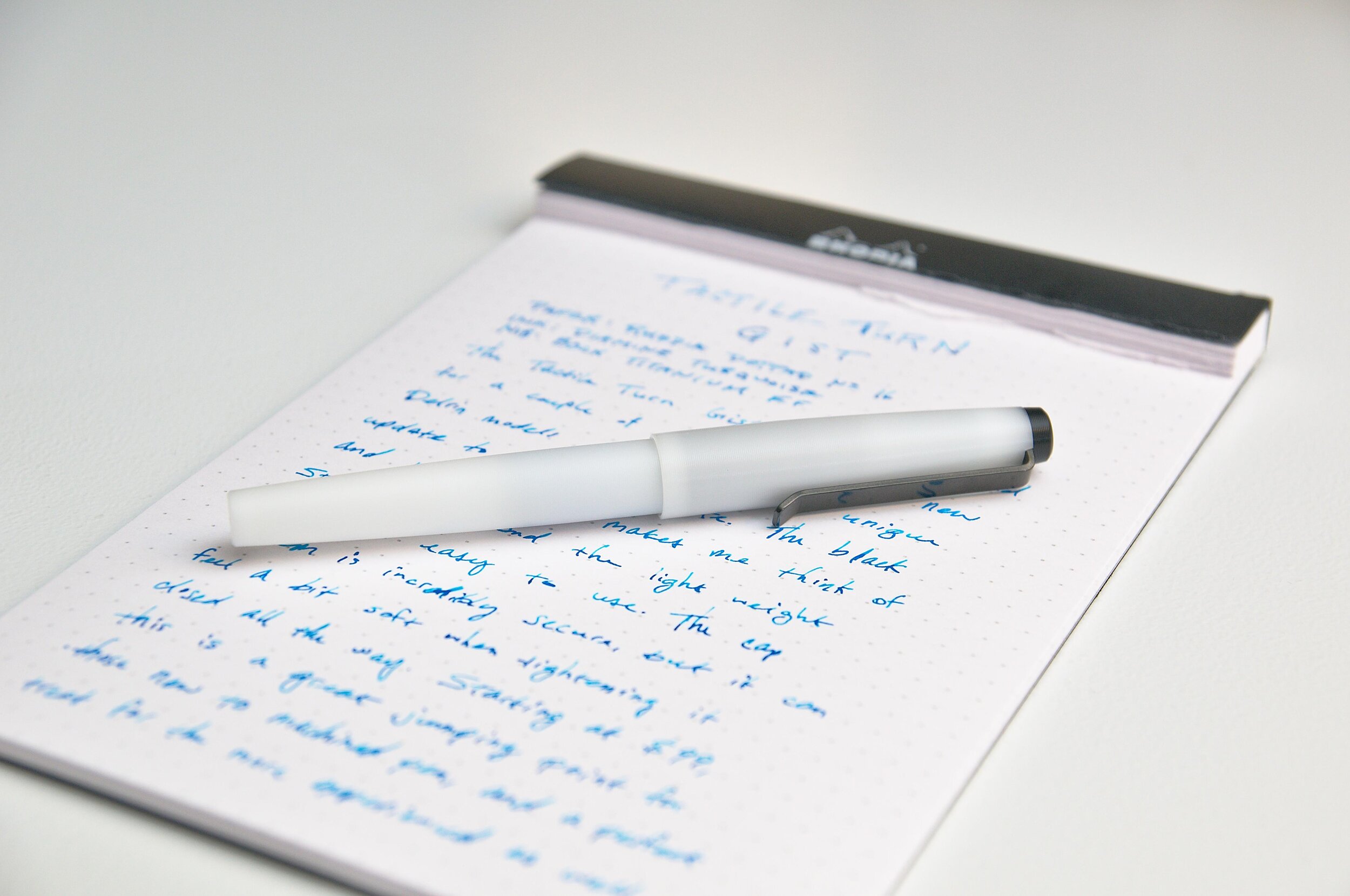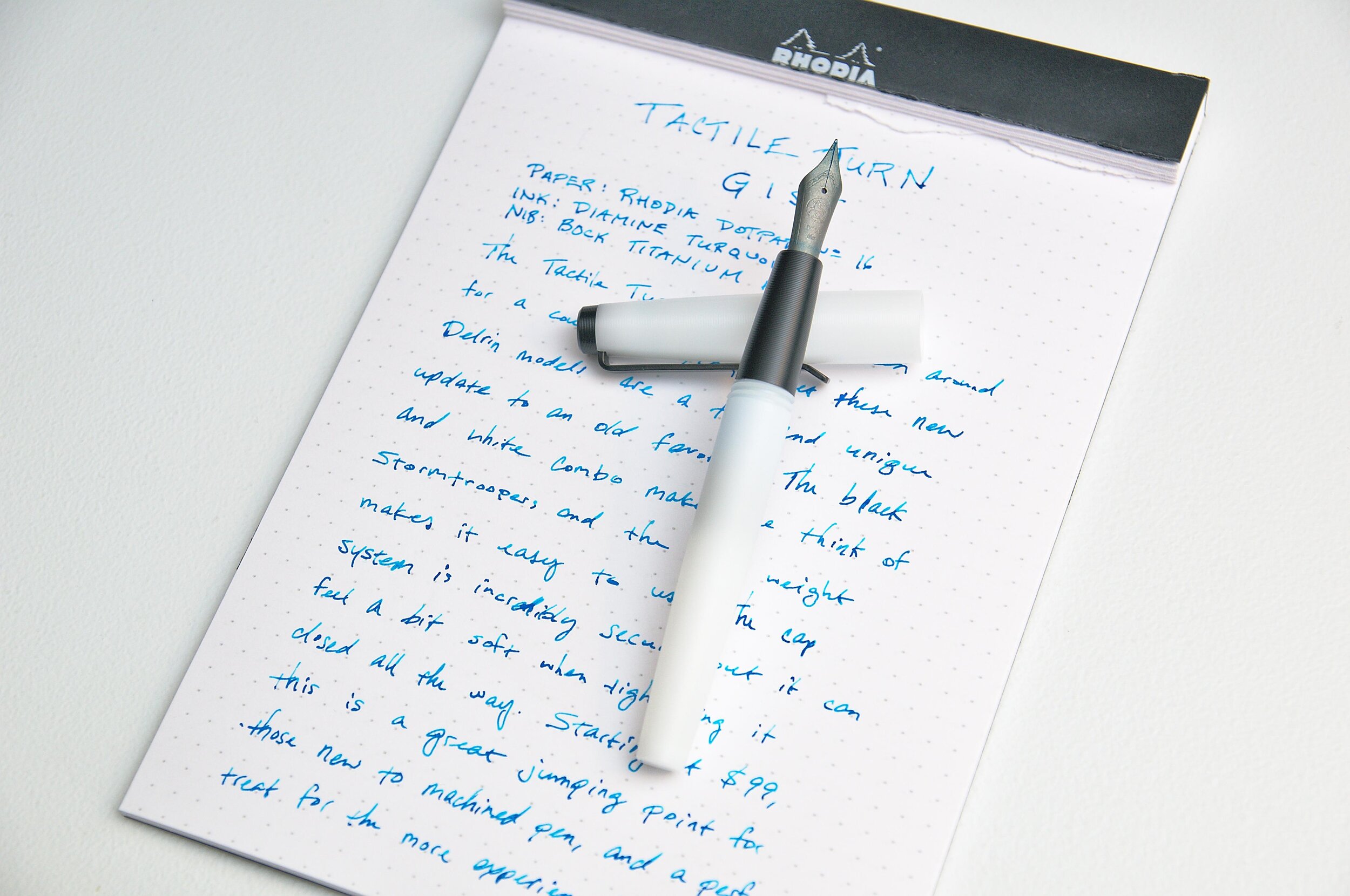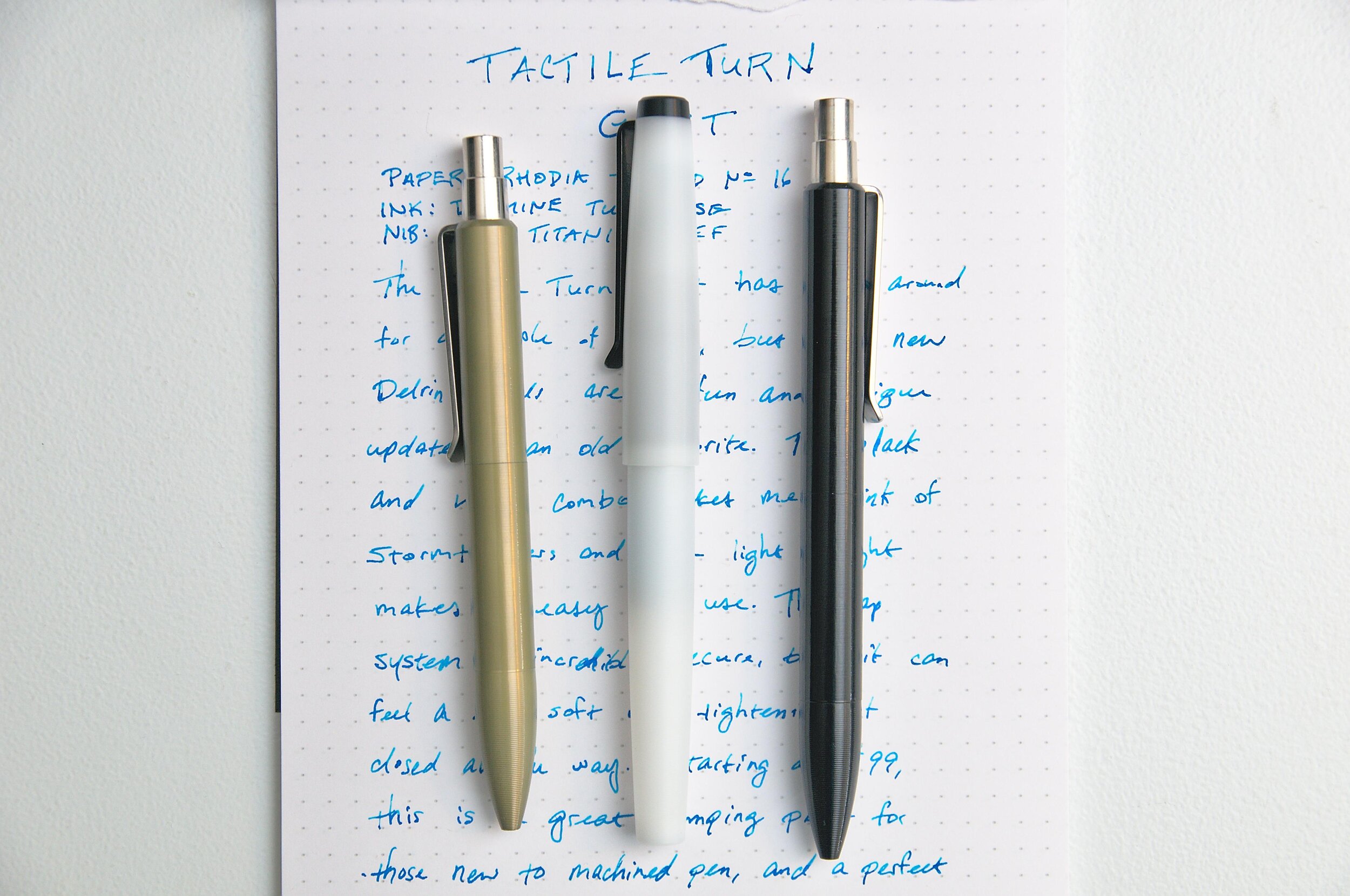(Jeff Abbott is a regular contributor at The Pen Addict. You can find more from Jeff online at Draft Evolution and Twitter.)
Back in 2015, I reviewed the second generation of Tactile Turn's retractable pen — the Mover. I was enamored with that pen and loved carrying it around with me on my day-to-day errands and office work. I don't carry it around quite as much today, but my fondness for the pen hasn't changed at all. Recently, I was given the opportunity to try out a new version of Tactile Turn's popular Gist fountain pen. The Black and White Delrin fountain pen is a beauty, and it still manages to capture some of that early magic that I enjoyed so much with the Mover.
So, what is Delrin? My incredibly simplistic definition likely won't do it the full justice it deserves, but Delrin is a brand name of synthetic polymer thermoplastic material. It's incredibly lightweight while also being very durable and rigid. According to many machinists, it's a fantastic material for learning and practicing the art of turning pens due to being more cost effective and forgiving than other materials. Aside from that, it's also a really cool material that has a unique aesthetic and great performance. If you ever hold a pen made from Delrin, you might catch yourself thinking that it feels a lot like a Lamy 2000. And, you wouldn't be entirely wrong. The Lamy 2000 is made of Makrolon — another name brand thermoplastic polymer. While they aren't chemically identical, they're similar enough to share the same benefits and general characteristics.
Compared to metal, plastics are a lot lighter. The aluminum, copper, and brass versions of the Gist are a good deal heavier than the Delrin version, but that doesn't mean the Delrin version is brittle, cheap, or disposable. We're not talking about the plastic material used in a Pilot G2 or Bic — Delrin (and other similar materials) are extremely durable, rigid, and strong. You can put this pen through a lot of abuse and it will just keep on working. Over time, it also develops a unique look. And, being a Tactile Turn pen, the Gist also has the characteristic grooves all along the cap, barrel, and grip section, adding extra grip that I really appreciate.
The Gist isn't a new pen by any means, but this new material and color combination is phenomenal. The creamy white matched up with the black trim is enticing, and it reminds me of a stormtrooper uniform. The cap and barrel are both slightly transparent, allowing some of the light to pass through if there's nothing inside the pen. In the cap, you can see where the grip section ends and the nib begins. In the body, you can see where the converter or the cartridge ends. I think it's great - something between a solid and demonstrator.
On the color combination I have, the grip section, the clip, and the finial are all black. The clip is metal, but everything is made of the same Delrin material. The contrast is great, but I recognize that not everyone will agree. And that's fine because there are other options. In Delrin, you can also choose a completely white model or a completely black model. With any Gist you purchase, you have the option of picking a black or silver clip. If you're not into the Delrin material, you can also choose from titanium, copper, or brass. And, if you're not a fountain pen fan, you can also pick any of these up in the rollerball configuration. You can browse all the different materials and colors on their website.
After uncapping the pen, you're greeted with a really well-balanced pen. The black section marries perfectly to the body, and the long #6 nib has just the right length to compliment the other components.
The section accepts either short international cartridges or an international converter. Keep in mind that longer or wider converters will not fit in this body, so just stick with the converter that comes with the pen.
After inking up the pen, I was excited to try out this titanium nib. I've used titanium nibs before, but never in a pen that I've been able to use for more than a few minutes. While I will say that the writing experience has been great, it was a bit disappointing that this nib writes like a medium instead of extra fine imprinted on the nib. I have nothing against medium nibs, but it's not what was advertised. That being said, I really like this nib and I've also decided that I'll probably go for a titanium nib any time I have the option. It's a lightweight and flexible material and has a great amount of tactile feedback that is similar to a steel nib. To me, this titanium nib is the perfect marriage of what I love about steel and gold nibs. Gold nibs are soft and flexible, while steel nibs have a more rigid stance and provide greater feedback from the page. The soft tactility of the titanium nib is fantastic.
The nib is fairly wet, but that's how I prefer wider nibs. And, given the soft nature of the material, it's also fairly easy to create some line variation if you apply a small amount of pressure on the down-strokes.
Writing with the pen is extremely comfortable. The grip section is long enough to provide plenty of space for my fingers and the way I hold the pen, and the threads that hold the cap are flat on top, meaning they don't irritate my fingers when they rest on the threads for longer periods of time. The length of the uncapped pen is perfect for my hand, but writing with the cap posted is also perfectly comfortable.
One area that I have complained when using this pen is opening and closing the cap. The unique threads are solid in operation, but the beginning and end of the threads aren't as sure-footed as I'd like. Threading the cap onto the body can feel a little mushy at times, and the same is true when I tighten the cap to the end of the threads. When tightening to the end, there isn't a distinguished feeling that I've reached the end of the threads. Sure, it gets tighter and requires more pressure, but I don't feel like I've ever reached the end of the road. On the other end, I feel like I sometimes have to fish around a bit for the threads to really grip correctly when I place the cap on the pen to close it. These are minor complaints, but they're worth pointing out. Keep in mind that I'm only using a single copy of the Gist for this review. This may be a very isolated issue that doesn't affect others.
Finally, when it comes down to price, the Gist is priced very fairly for a machined pen from a small shop. The Delrin pens start at $99. This price includes a steel nib in either EF, F, M, or B size and either a silver or black clip. For $60 more, you can choose from the same list of nib sizes but in titanium. If you opt for the brass, copper, or titanium materials, the price goes up accordingly.
The Tactile Turn Gist is a pen that I quickly fell in love with after using it for a few minutes. Despite the mislabeled nib, I love how this pen writes and how it feels in my hand while writing and even while capped. The Delrin material is incredibly rigid but has a familiar warmth that makes it fun to use. If it's in your price range and you like the aesthetic, I can't recommend this pen enough.
(JetPens provided this product at no charge to The Pen Addict for review purposes.)
Enjoy reading The Pen Addict? Then consider becoming a member to receive additional weekly content, giveaways, and discounts in The Pen Addict shop. Plus, you support me and the site directly, for which I am very grateful.
Membership starts at just $5/month, with a discounted annual option available. To find out more about membership click here and join us!











